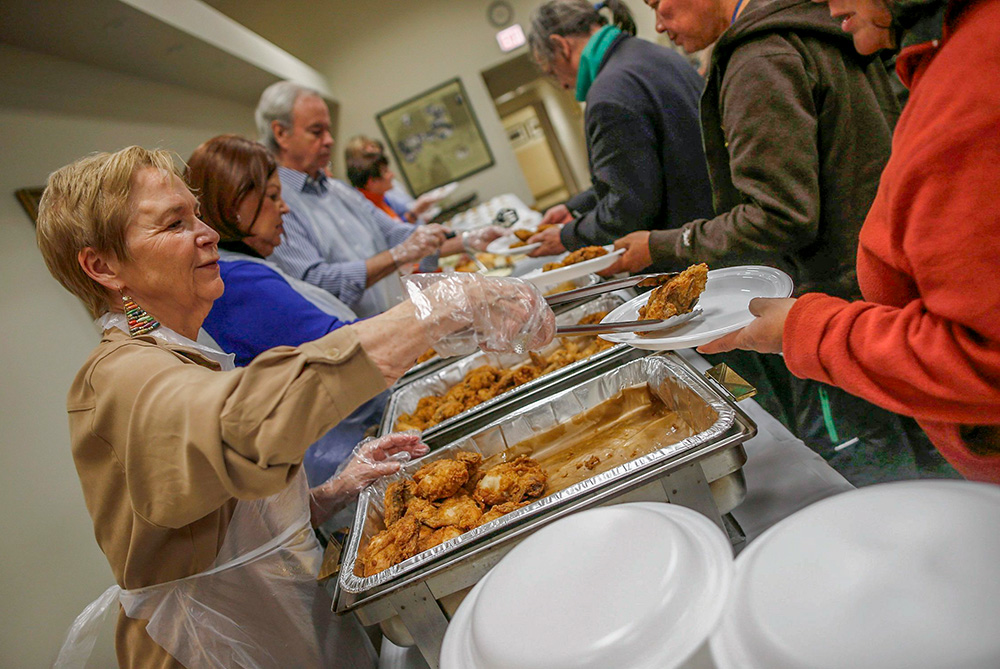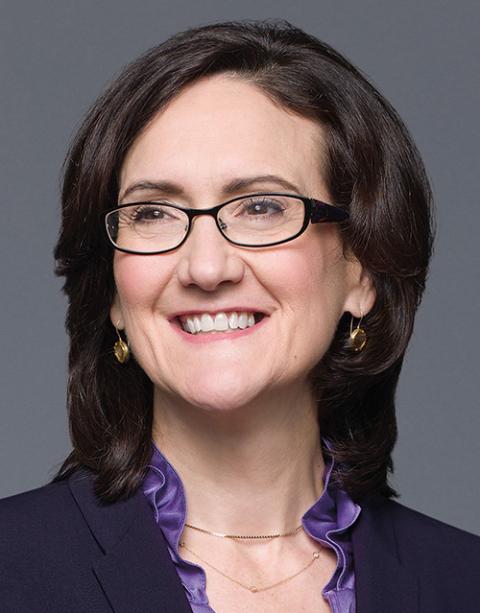
In a 2013 file photo, volunteers serve people during a free dinner provided by the Emergency Assistance Department of Chicago Catholic Charities. (CNS/Reuters/Jim Young)
Catholic Charities of the Archdiocese of Chicago will end 75 government contracts for services such as child care and youth programs, behavioral health counseling, senior care, veterans' services and others, beginning July 1.
The cuts will also mean the elimination of 300 jobs for the region's largest social service provider. The contracts represent 12% of the organization's current operating budget, or about $24 million.
"We are reducing our footprint as a government contractor so we can increase our attention to being a faith-based human service provider," said Sally Blount, president and CEO of Catholic Charities Chicago. "When we sign a government contract, we agree not to mention Jesus in that work, in many cases."
Catholic Charities Chicago will retain about 60-70 state and federal contracts, with more than $100 million a year in funding, Blount said.
The move, initially presented in March, is part of a larger "Vision 2030" strategic plan, in which Catholic Charities Chicago looked at all of its government contracts to determine which best aligned with its priorities and provide the greatest impact.
The strategic planning was an attempt to organize to "meet the current need but also ensure long-term sustainability," said Blount, who is also a professor of strategy at the Kellogg School of Management at Northwestern University, where she previously served as dean.
Advertisement
The board-led strategic planning was done with assistance from the Bridgespan Group and was the final step in a more than three-year process since Blount was hired in 2020 as CEO "to strengthen Catholic Charities' governance, operations, and financial oversight," according to a press release.
Board Chair Michael Monticello said the process was a time to reflect and reimagine. "Over the past year, we have come to understand that if we want to increase our impact over the years ahead, we must sharpen our strategic focus, while simultaneously reducing the time our staff spends navigating an increasingly complex and uncertain government funding environment," he said in a press release.
Blount noted that not all government contracts have kept up with inflation or with the true cost of delivering the services. "If things aren't core to your central mission and they aren't covering their cost, there's a question about whether you should be doing them," she said
Blount has said previously that Catholic Charities will rely more on private funding in the future.
Among Catholic Charities Chicago's priorities will be serving mothers and families with pregnancy and parenting services, as well as community-based programs that provide for basic needs such as food, clothing and shelter, Blount said. It also will focus on senior housing and related support services.
Exiting from some contracts will "free up resources" to be able to "serve more deeply" in prioritized areas, she said.
"We made a decision to back away from some youth programming because there are many other organizations who do a whole lot more of it than we do and are better at it," Blount said.
"You have to decide strategically what you're good at, and that's what you say yes to, and then have the courage to say no to the things that distract you from what you're really good at," Blount said.
Many of the contracts Catholic Charities dropped have been picked up by other Chicago-area organizations, including Catholic groups such as Big Shoulders Fund and Maryville Academy. Some of those organizations have hired Catholic Charities employees who lost their jobs in the reorganization, Blount said.
She also noted that some government contracts come with high administrative and reporting costs. "A lot of these programs were draining resources," she said, noting that the organization's budget for fiscal year 2025 already has a $10 million smaller deficit because of the cutting of some government contracts.
Catholic Charities Chicago had already stopped contracting with the state for foster care in 2007 when it could not find liability insurance after it settled a lawsuit for $12 million over the alleged abuse of three children in a foster home in the 1990s.
In the past 18 months, the organization has worked with government and community partners in helping to resettle 20,000 migrants and refugees in the Chicago area. While the housing is state-subsidized, charitable giving has funded Catholic Charities' distribution of gift cards at Christmas as well as other services to migrants.
Chicago Cardinal Blase Cupich, speaking at a public event May 16 at a church in Wilmette, said the decision to withdraw from some government contracts made financial sense, because Catholic Charities was having to make up the shortfall in funding for those programs.
"Increasingly, the donations of people who support Catholic Charities was funding government programs," he said. "If the state wants these programs, they should pay for them."
"We have to fund things that are in our wheelhouse," the cardinal added. "The state has programs; let them do that. But we know what we want to do."







